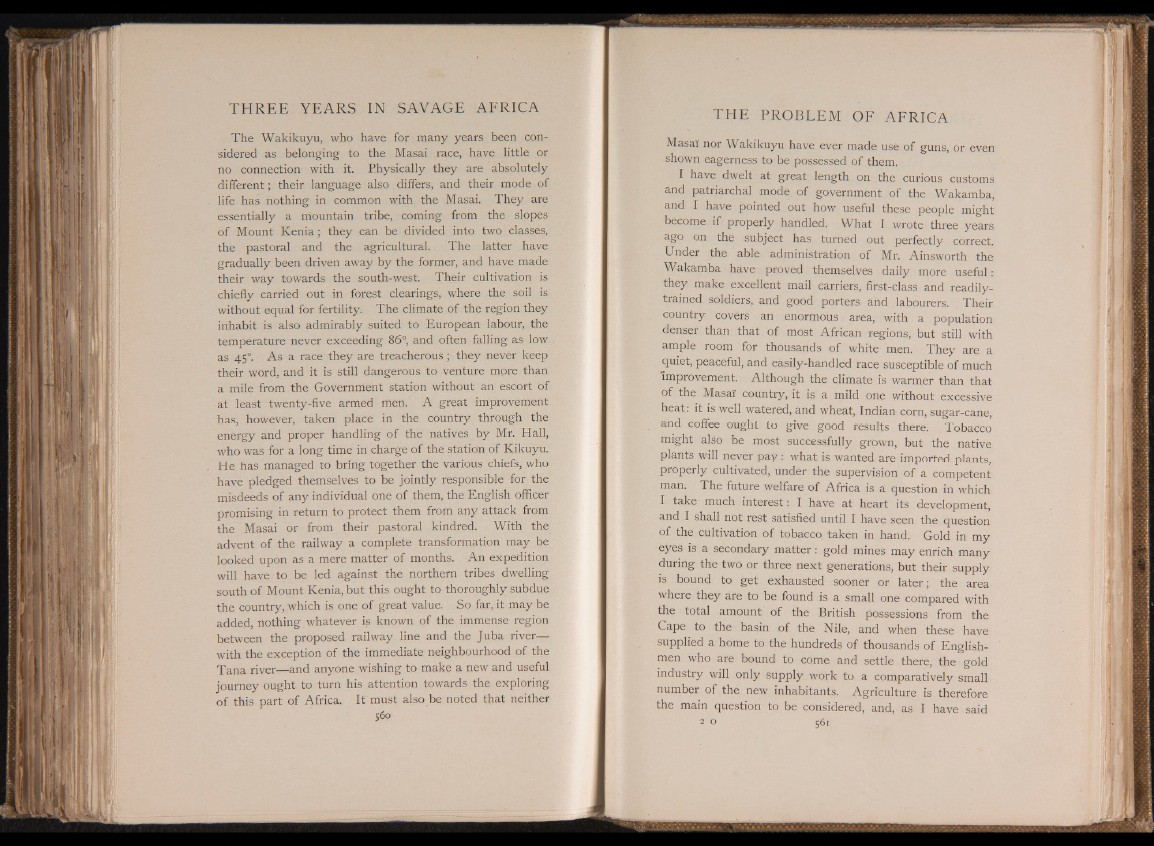
The Wakikuyu, who have for many years been considered
as belonging to the Masai race, have little or
no connection with it. Physically they are absolutely
different; their language also differs, and their mode of
life has nothing in common with the Masai. They are
essentially a mountain tribe, coming from the slopes
of Mount Kenia; they can be divided into two classes,
the pastoral and the agricultural. The latter have
gradually been driven away by the former, and have made
their way towards the south-west. Their cultivation is
chiefly carried out in forest clearings, where the soil is
without equal for fertility: The climate of the region they
inhabit is also admirably suited to European labour, the
temperature never exceeding 86°, and often falling as low
as 45° As a race they are treacherous; they never keep
their word, and it is still dangerous to venture more than
a mile from the Government station without an escort of
at least twenty-five armed men. A great improvement
has, however, taken place in the country through the
energy and proper handling of the natives by Mr. Hall,
who was for a long time in charge of the station of Kikuyu.
He has managed to bring together the various chiefs, who
have pledged themselves to be jointly responsible for the
misdeeds of any individual one of them, the English officer
promising in return to protect them from any attack from
the Masai or from their pastoral kindred. With the
advent of the railway a complete transformation may be
looked upon as a mere matter of months. An expedition
will have to be led against the northern tribes dwelling
south of Mount Kenia, but this ought to thoroughly subdue
the country, which is one of great value. So far, it may be
added, nothing whatever is known of the immense region
between the proposed railway line and the Juba river—§>
with the exception of the immediate neighbourhood of the
Tana river—and anyone wishing to make a new and useful
journey ought to turn his attention towards the exploring
of this part of Africa. It must also be noted that neither
560
Masai nor Wakikuyu have ever made use of guns, or even
shown eagerness to be possessed of them.
I have dwelt at great length on the curious customs
and patriarchal mode of government of the Wakamba,
and I have pointed out how useful these people might
become if properly handled. What I wrote three years
ago on the subject has turned out perfectly correct.
Under the able administration of Mr. Ainsworth the
Wakamba have proved themselves daily more useful:
they make excellent mail carriers, first-class and readily-
trained soldiers, and good porters and labourers. Their
country covers an enormous area, with a population
denser than that of most African regions, but still with
ample room for thousands of white men. They are a
quiet, peaceful, and easily-handled race susceptible of much
improvement. Although the climate is warmer than that
of the Masai country, it is a mild one without excessive
heat: it is well watered, and wheat, Indian corn, sugar-cane,
and coffee ought to give good results there. Tobacco
might also be most successfully grown, but the native
plants will never pay: what is wanted are imported plants,
properly cultivated, under the supervision of a competent
man. The future welfare of Africa is a question in which
I take much interest: I have at heart its development,
and I shall not rest satisfied until I have seen the question
of the cultivation of tobacco taken in hand; Gold in my
eyes is a secondary matter: gold mines may enrich many
during the two or three next generations, but their supply
is bound to get exhausted sooner or later; the area
where they are to be found is a small one compared with
the total amount of the British possessions from the
Cape to the basin of the Nile, and when these have
supplied a home to the hundreds of thousands of Englishmen
who are bound to come and settle there, the gold
industry will only supply work to a comparatively small
number of the new inhabitants. Agriculture is therefore
the main question to be considered, and, as I have said
2 O 561